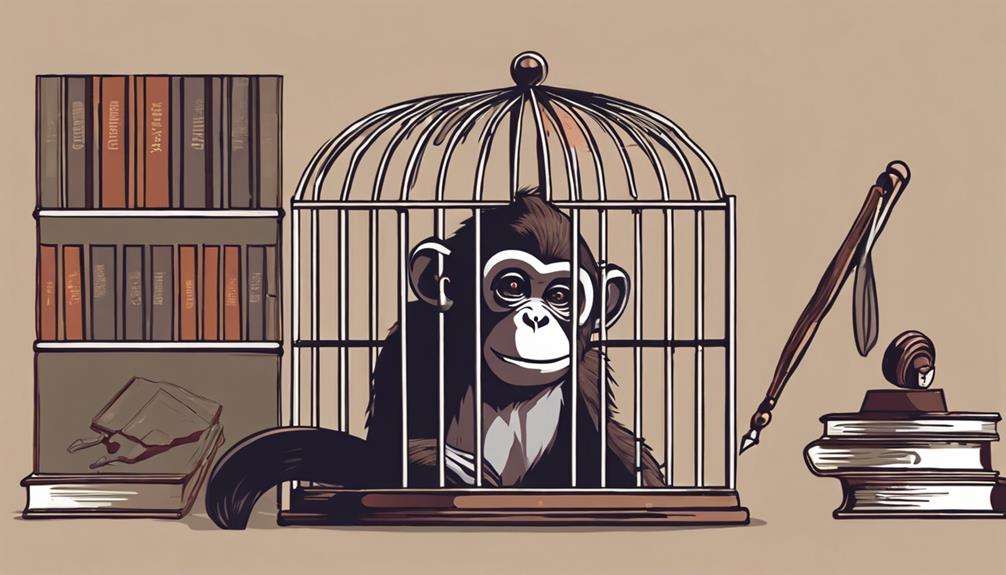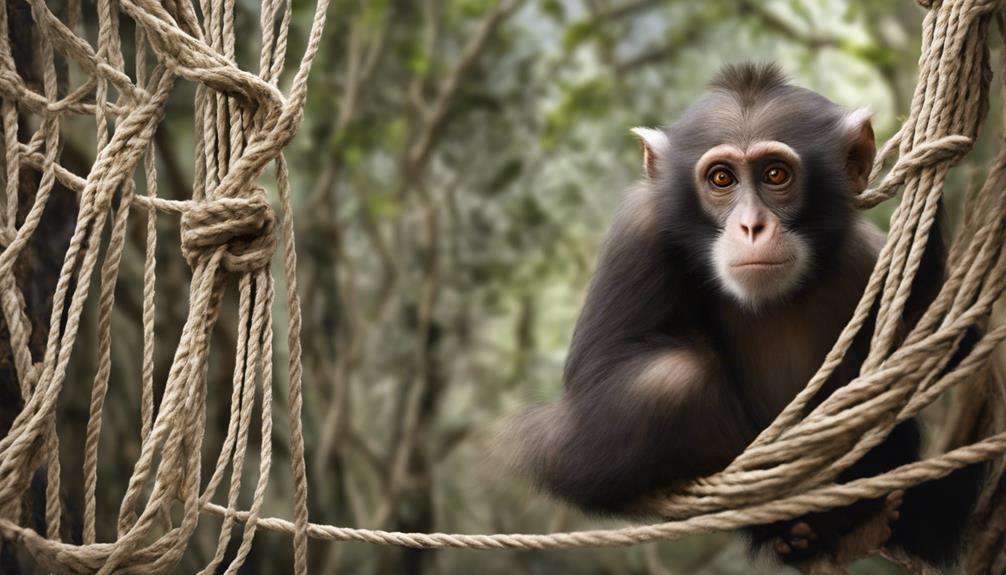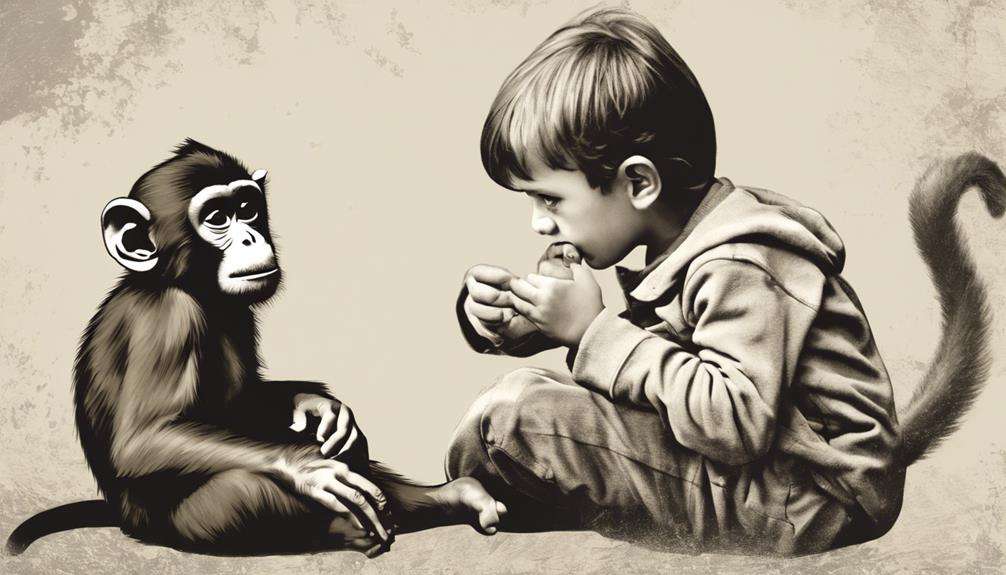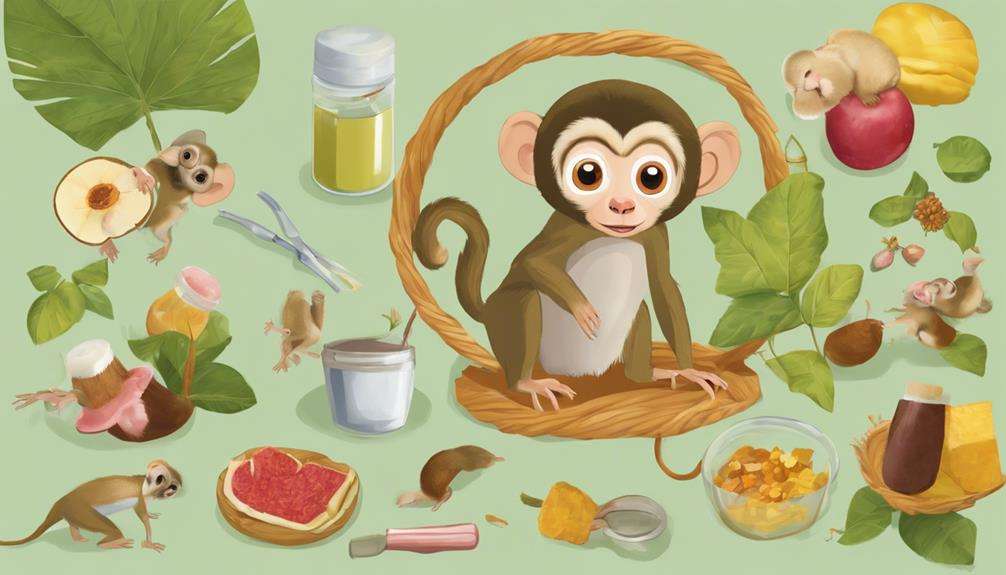If you're pondering the possibilities of having a pet primate, ponder no more. The allure of their intelligence and companionship may beckon, but have you thought about the intricacies that come with caring for these creatures?
From specialized needs to potential health hazards, social demands, and legal entanglements, the journey of having a pet primate is a multifaceted one.
It's a path that requires not just affection but also a deep sense of responsibility. Are you ready for the challenges that may lie ahead?
Key Takeaways
- Pet primates offer long-term companionship and mental stimulation.
- Specialized care, diet, and training are essential for their well-being.
- Risks include zoonotic diseases and high financial responsibilities.
- Legal restrictions, aggression, and ethical concerns are drawbacks of owning pet primates.
Unique Pros of Pet Primates
When considering the unique pros of owning a pet primate, their exceptional lifespan of 20 to 40 years stands out as a significant advantage. These social and intelligent animals offer the potential for long-term companionship, allowing you to build a strong bond that can last for decades.
Primates, known for their cognitive abilities, can provide mental stimulation and entertainment through quick learning of tasks and tricks. Their intelligence and adaptability make them capable of being trained to perform a variety of activities, showcasing their remarkable skills.
Additionally, the social nature of pet primates means that they can form deep connections with their owners, offering affectionate interactions and emotional support. The extended lifespan of these animals allows for enduring relationships and the opportunity to create lasting memories with a pet that isn't only intelligent but also deeply connected to you.
Special Needs of Pet Primates
Pet primates have specific dietary requirements that must be met to prevent health issues like metabolic bone disease.
Ensuring enrichment activities for primates is essential due to their social nature and need for mental stimulation.
Remember that aggressive behaviors may arise, necessitating specialized care and training to manage potential risks.
Primate Dietary Requirements
Specialized dietary requirements are essential for ensuring the best health and well-being of pet primates. Pet primates have specific dietary needs that must be met to prevent health issues such as metabolic bone disease. Their specialized diet may consist of a diverse range of foods including fruits, vegetables, nuts, and insects to guarantee they receive proper nutrition.
Failure to provide the correct diet can result in conditions like diabetes, obesity, and other metabolic disorders in pet primates. Some primates may require vitamin supplements or specific food items like protein-rich sources to maintain the best health. It's important to seek guidance from a specialized veterinarian or primate nutritionist to develop a balanced and suitable diet plan tailored to the individual needs of pet primates.
Enrichment for Primates
To guarantee the best well-being of pet primates, providing mental and physical enrichment that mimics their natural habitat is essential. Enrichment activities such as foraging puzzles, climbing structures, and social interactions play an important role in keeping pet primates mentally stimulated and engaged. Lack of enrichment can lead to boredom, stress, and the development of behavioral issues in these animals.
Potential Health Risks of Pet Primates

Pet primates can transmit zoonotic diseases to humans through bites or scratches, posing a significant health risk.
The potential exposure to dormant illnesses within primates can lead to severe complications in humans.
It's important to be aware of the health risks associated with keeping pet primates to make sure proper precautions are taken.
Zoonotic Disease Transmission
Exposure to zoonotic diseases from pet primates, such as tuberculosis and hepatitis virus, presents a significant health risk to humans. These diseases can be transmitted through direct contact with bodily fluids, feces, or respiratory droplets from infected primates.
To mitigate this risk, strict hygiene and sanitation practices should be followed when interacting with pet primates. Regular cleaning of enclosures, proper disposal of waste, and frequent handwashing are important steps in preventing the spread of zoonotic diseases.
Additionally, aggressive behavior in pet primates, particularly as they mature, can pose a danger to owners, increasing the potential for bites or scratches that could lead to infections. Understanding and managing aggressive tendencies in pet primates is essential for maintaining a safe environment for both humans and animals.
Behavioral Challenges
Behavioral challenges in pet primates present significant potential health risks for owners due to their complex social dynamics and natural instincts. Pet primates may carry parasites and diseases that can be transmitted to humans through bites and scratches, leading to zoonotic illnesses.
Contact with these animals can result in health issues due to the potential transmission of diseases, including dormant ones that could affect humans. Exposure to pet primates can result in serious health complications for individuals, highlighting the importance of understanding and managing the behavioral challenges associated with owning such animals.
Owners must be aware of the health risks posed by pet primates and take necessary precautions to safeguard their well-being.
Social Interaction Challenges With Pet Primates
Regularly engaging in social interactions with pet primates is crucial for their overall well-being and mental health. Pet primates, much like their wild counterparts, rely heavily on social interaction to thrive. Without proper socialization, they can develop behavioral issues such as aggression and depression.
In the wild, social dynamics within primate groups are complex, with individuals forming strong bonds and relying on companionship for support. These social structures need to be replicated in captivity to guarantee the welfare of pet primates. Isolation and lack of social interaction can have long-term negative effects on their psychological well-being.
As companion animals, pet primates require consistent and meaningful social interactions to prevent the development of behavioral problems and to promote their overall mental health. Owners must dedicate time and effort to understanding the social needs of their pet primates and providing them with suitable opportunities for social engagement.
Legal Considerations for Pet Primates

Legal responsibilities associated with owning pet primates encompass adherence to state-specific regulations, insurance requirements, and potential home inspections to guarantee compliance and proper care standards.
Some U.S. states have outright bans on owning pet primates, with violations leading to fines and confiscation. Additionally, insurance coverage for pet primates may be necessary, as the risks involved could lead to policy cancellations without adequate protection.
Permit holders might undergo home inspections to make sure they're meeting regulations and providing proper care. It's important to research and understand the legal considerations surrounding pet primates, as laws vary globally and non-compliance can result in fines and challenges in relocating or rehoming the animal.
Behavioral Issues in Pet Primates
Owning a pet primate necessitates a deep understanding of their intricate social needs to prevent potential behavioral challenges. Pet monkeys are social animals that rely on interactions within their own species for mental and emotional well-being. When isolated in captivity, these animals may exhibit behavioral issues such as aggression and violence towards their owners. This aggressive behavior can pose a significant risk of harm, highlighting the importance of proper socialization for pet primates.
Proper care and attention are essential to prevent behavioral problems in pet monkeys. Due to their complex social systems, many pet primates require interaction with others of their kind to thrive. Without this socialization, they may develop mental health issues stemming from loneliness and isolation. It's vital for pet primate owners to provide environments that allow for social interactions and mimic the natural social structures that these animals experience in the wild. By addressing their social needs, owners can help prevent behavioral challenges and promote the well-being of their pet primates.
Environmental Enrichment for Pet Primates

To enhance the well-being of your pet primate, incorporate environmental enrichment by providing a variety of stimulating toys, climbing structures, and interactive feeding devices. Toys play an important role in keeping your pet primate mentally engaged and preventing boredom. Puzzles and foraging opportunities can stimulate their natural behaviors, encouraging problem-solving skills and exploration.
Climbing structures, ropes, and swings offer physical exercise and mental stimulation, mimicking their natural habitat where they'd spend hours climbing and swinging. It's essential to rotate toys regularly and introduce new items to keep your pet primate curious and engaged. Natural materials like branches, leaves, and bedding can create a more enriching living environment, allowing your primate to engage in nesting behaviors.
Interactive feeding devices and puzzle feeders can provide mental stimulation during meal times, preventing food boredom and encouraging your pet primate to work for their food, promoting both physical and mental well-being.
Financial Responsibilities of Pet Primates
Financial responsibility for pet primates entails a substantial initial investment and ongoing expenses for their care and well-being. The initial cost of acquiring an exotic pet primate can vary widely, ranging from $5,000 to $50,000, depending on the species. Beyond the purchase price, the financial commitment includes ongoing expenses such as specialized diets, veterinary care, and regular check-ups.
Additionally, owning a pet primate may lead to increased home insurance premiums, necessitating additional coverage to account for the potential risks associated with exotic pets. Emergency medical costs for pet primates can also be significant, further adding to the financial responsibilities of ownership. Long-term care considerations, like consistent veterinary visits and specialized care, contribute to the overall financial investment required for ensuring the health and well-being of a pet primate.
Therefore, potential pet primate owners should carefully consider the ongoing expenses and financial commitment involved in caring for these unique animals.
Frequently Asked Questions
What Are the Disadvantages of Having a Pet Monkey?
Having a pet monkey brings behavioral challenges like aggression and destructive tendencies. Legal restrictions limit ownership due to safety concerns. Zoonotic diseases can be transmitted through bites or scratches, posing health risks for owners.
What Are the Benefits of Having a Pet Monkey?
Owning a pet monkey can bring unique benefits. Bonding opportunities with these intelligent creatures offer emotional support and companionship. Their long lifespan allows for lasting relationships, while their social nature provides enriching interactions.
Should Primates Be Kept as Pets?
You shouldn't keep primates as pets. It's not ethical or legal. They come with behavioral challenges and need social companionship. Respect their natural habitat and avoid the risks of aggression and health issues.
What Are the Cons of Owning a Finger Monkey?
Owning a finger monkey can bring legal restrictions, health risks, and behavioral challenges. Meeting their care requirements and socialization needs may be demanding. Space limitations and potential legal consequences should be considered before getting one.
Conclusion
To summarize, owning a pet primate can be a rewarding experience due to their intelligence, companionship, and entertainment value. However, it's important to be aware of the specialized care, social interaction needs, health risks, legal considerations, and financial responsibilities that come with it.
By carefully considering these factors and being a responsible pet owner, you can provide a fulfilling and enriching life for your primate companion. Remember, coincidentally, the key to a happy relationship with your pet primate lies in understanding and meeting their unique needs.






